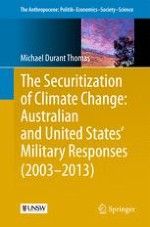
2017 | OriginalPaper | Buchkapitel
1. The Strategic Dissonance of Australia’s Climate Security Response
verfasst von : Michael Durant Thomas
Erschienen in: The Securitization of Climate Change: Australian and United States' Military Responses (2003 - 2013)
Aktivieren Sie unsere intelligente Suche, um passende Fachinhalte oder Patente zu finden.
Wählen Sie Textabschnitte aus um mit Künstlicher Intelligenz passenden Patente zu finden. powered by
Markieren Sie Textabschnitte, um KI-gestützt weitere passende Inhalte zu finden. powered by